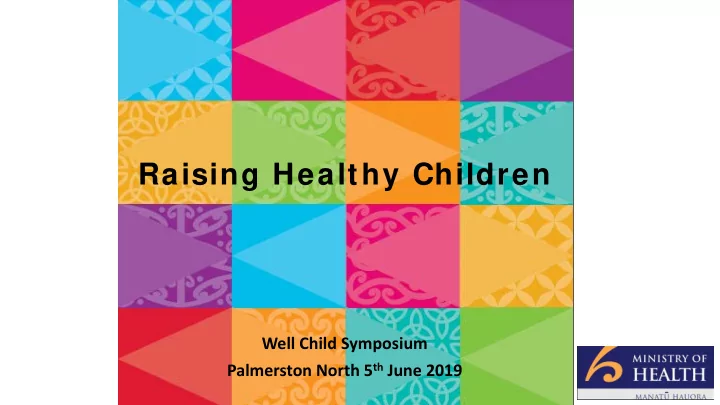

Raising Healthy Children Well Child Symposium Palmerston North 5 th June 2019
Why invest in early childhood? There are moral, political and economic arguments for investing in children. • Currently children in New Zealand face significant inter-generational, ethnic and socioeconomic inequity, which is perpetuated by recent politico-social structures. • A social justice lens, applied to our investment in children, shows clearly the inequitable and unjust distribution of resources, and the consequent disparities in health, social and economic outcomes • Te Tiriti o Waitangi and the UN Convention on the Rights of the Child require us to do more to address this inequity • Nobel laureate and economist, James Heckman has shown that programs based on fundamental principles of human growth and development and delivered in the early years offer the best return on investment
The health sector’s role in the first 1000 days 1. Use the opportunities we have to anticipate health and social outcomes 2. Prioritise early intervention and the life course approach 3. Promote, support and advocate for: 1. w hānau, parent, infant and child mental health 2. healthy nutrition, physical activity and sleep 3. equitable access to health and social services 4. early childhood education and literacy 5. safe homes, communities and neighbourhoods 4. Provide 1. skilled clinical assessment, screening and health surveillance 2. parenting and relationship support 5. Work with partners to create a social safety net for children 6. Utilise our skills in monitoring and evaluation
Equity and embracing Māori and Pacific models of health/hauora Te Whare Tapa Wha. Mason Durie
Māori child health and Whānau Ora ra • Tamariki and rangatahi M ā ori have historically experienced poorer health and education outcomes than the general NZ population. • They are over-represented in care and protection, and youth justice statistics. • The Treaty of Waitangi (Te Tiriti), forms the basis for the expectation that tamariki and rangatahi Māori have the right to equitable health, education, social and employment outcomes, and equitable treatment under the care and protection and justice systems. • Whānau Ora empowers whānau as a whole rather than focusing separately on individual members and their issues.
Shonkoff's bio-developmental framework diagram (Source: Shonkoff 2010
Health and development over the lifecourse • The developmental life course approach arises from the evidence that early life events have positive or adverse effects, which may persist in later life through modification of life trajectories. • A developing child’s genetic make-up and their environment interact as they develop • The brain’s most dramatic development occurs during pregnancy and in the first three years after birth • During this time, the neural pathways being laid down affect a child’s future learning, health and behaviour
Preconception and pregnancy Reduce materno-fetal exposure to stress and toxins • Malnutrition • Smoking • Alcohol and other drug use • Stress and mental illness • Environmental toxins (e.g. lead, mercury) • Prescription drugs (e.g. valproate) • Infections (e.g. rubella, toxoplasmosis, CMV)
Critical and sensitive periods of brain development • Critical periods mainly affect sensory development (vision and hearing) • Lack of adequate stimulus during these periods irreversibly affect normal brain development. • Sensitive developmental stages in childhood and adolescence are times when certain key developmental tasks are easier to acquire.
Adverse Childhood Events • ACEs are a set of early life events with severe and predictable adverse effects on long term life course. • The long-term consequences of ACEs are not always preventable.
Adverse childhood events (ACEs) predict poor adult health Individuals with ≥ 4 ACEs, compared to those with less are: • 1.4 times more likely to have an unhealthy weight • 2.8 times more likely to smoke tobacco • 4.2 times more likely to have a teenage pregnancy 4.4 times more likely to suffer depression • • 5.6 times more likely to use illicit drugs and 10 times more likely to have problematic drug use • 30 times more likely to attempt suicide
Interventions early in life are more cost - effective • Programs based on fundamental principles of human growth and development and delivered in the early years offer the best return on investment James Heckman • ... the prevention of deaths is only likely to involve net economic advantage if it applies to children or young adults, and beyond the age of about 50 the economic outcome is increasingly negative as applied to preventive measures which extend survival. Health Select Committee report on child health Dec 2013 www.parliament.nz/resource/0002018580 Geoffrey Rose ,
Summary “We need to enable children to move from one stage of development to another without burden” – Professor Sir Peter Gluckman 1. Pregnancy and early childhood incorporate sensitive and critical periods in the life course which underpin life trajectories 2. Health and wellbeing inequities are the fundamental drivers of most of our current health, education and social problems 3. The WCTO programme has an important role in improving outcomes, but can’t do it by itself The biggest problem we face is not lack of knowledge, but a failure to implement what we know and evaluate our progress
Recommend
More recommend